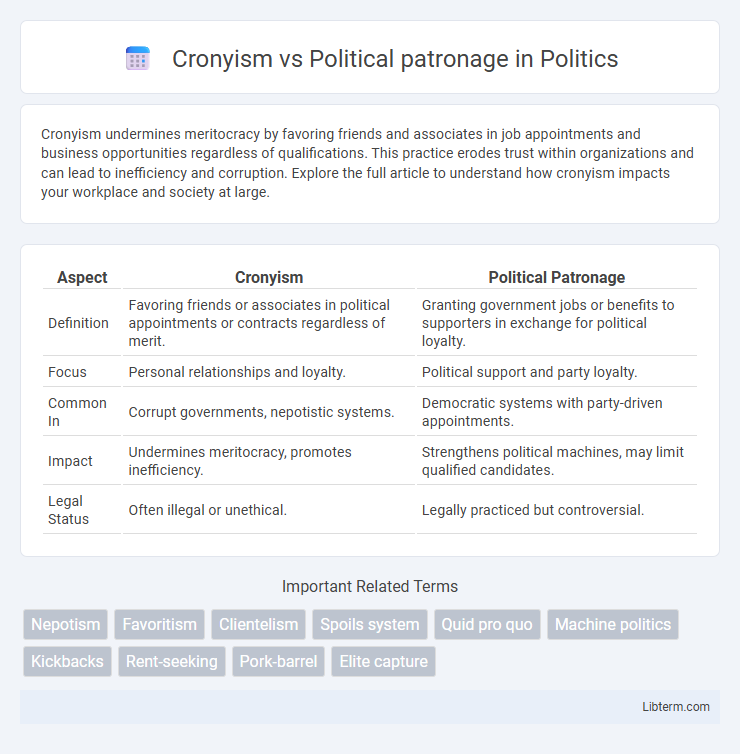Cronyism undermines meritocracy by favoring friends and associates in job appointments and business opportunities regardless of qualifications. This practice erodes trust within organizations and can lead to inefficiency and corruption. Explore the full article to understand how cronyism impacts your workplace and society at large.
Table of Comparison
| Aspect | Cronyism | Political Patronage |
|---|---|---|
| Definition | Favoring friends or associates in political appointments or contracts regardless of merit. | Granting government jobs or benefits to supporters in exchange for political loyalty. |
| Focus | Personal relationships and loyalty. | Political support and party loyalty. |
| Common In | Corrupt governments, nepotistic systems. | Democratic systems with party-driven appointments. |
| Impact | Undermines meritocracy, promotes inefficiency. | Strengthens political machines, may limit qualified candidates. |
| Legal Status | Often illegal or unethical. | Legally practiced but controversial. |
Understanding Cronyism: Definition and Key Features
Cronyism refers to the practice of favoring friends, relatives, or close associates in political appointments or business dealings, often disregarding merit or qualifications. Key features include nepotism, favoritism based on personal relationships, and the allocation of resources or opportunities to loyal supporters rather than the most deserving candidates. Unlike broader political patronage, cronyism specifically emphasizes favoritism rooted in personal connections rather than party loyalty or ideological alignment.
Political Patronage Explained: Scope and Impact
Political patronage involves granting government jobs and contracts to supporters, creating a system where loyalty often outweighs merit. This practice extends its reach across various levels of government, influencing policymaking and resource distribution. The impact includes undermined public trust, reduced administrative efficiency, and perpetuated inequality due to favoritism in appointments and decision-making.
Historical Roots of Cronyism and Patronage
Cronyism and political patronage both originate from ancient governance systems where loyalty and personal relationships shaped political power distribution, often undermining meritocracy. The historical roots trace back to classical civilizations such as the Roman Republic and Ancient Greece, where leaders rewarded friends and supporters with positions and favors to secure their influence. Over time, these practices institutionalized in various political regimes, embedding favoritism deeply into bureaucratic and political frameworks worldwide.
How Cronyism Differs from Political Patronage
Cronyism involves favoring friends or associates by giving them jobs or advantages, regardless of their qualifications, while political patronage specifically refers to awarding positions or benefits in exchange for political support. Cronyism emphasizes personal relationships over merit, whereas political patronage centers around maintaining or gaining political loyalty. Both practices undermine meritocracy but differ in the basis of favoritism--personal ties versus political allegiance.
Similarities Between Cronyism and Political Patronage
Cronyism and political patronage both involve the allocation of jobs, contracts, or favors to friends, family members, or loyal supporters rather than based on merit or qualifications. Both practices undermine fair competition and breed corruption within governmental or organizational structures. These systems prioritize personal loyalty and connections, which can erode public trust and weaken institutional integrity.
Impacts on Governance and Public Policy
Cronyism distorts governance by prioritizing personal relationships over merit, leading to inefficient public administration and eroded trust in institutions. Political patronage allocates resources and government positions based on loyalty rather than competence, resulting in policy decisions that serve narrow interests instead of the public good. Both practices undermine transparency, weaken accountability, and foster corruption, ultimately compromising the quality and effectiveness of public policy.
Case Studies: Cronyism in Modern Politics
Cronyism in modern politics is exemplified by the 2010s Brazilian government, where close allies of President Dilma Rousseff secured lucrative contracts and political appointments, undermining public trust and institutional integrity. Similarly, the case of former South African President Jacob Zuma reveals how political patronage networks enabled favoritism toward the Gupta family, significantly impacting governance and economic stability. These instances highlight the detrimental effects of cronyism, including corruption, weakened democratic processes, and hindered socio-economic development.
Political Patronage in Action: Real-World Examples
Political patronage in action is evident in historical and contemporary governments where leaders appoint loyal supporters to key positions regardless of qualifications, such as the infamous spoils system in 19th-century United States politics. In countries like India, political patronage often involves distribution of government contracts and jobs to party cronies, strengthening party loyalty and electoral support. This practice undermines meritocracy and perpetuates systemic corruption, impacting public trust and governance quality globally.
Combating Cronyism and Patronage: Policy Solutions
Combating cronyism and political patronage requires implementing transparent hiring practices and merit-based recruitment systems to ensure fairness in public sector employment. Strengthening legal frameworks that enforce anti-corruption measures and promoting independent oversight bodies improve accountability and reduce favoritism in government appointments. Enhancing civic engagement and empowering watchdog organizations further supports the detection and prevention of patronage networks in political institutions.
The Future of Accountability in Political Systems
Cronyism and political patronage undermine the future of accountability in political systems by prioritizing personal and partisan loyalty over merit and transparency, which erodes public trust and institutional integrity. Strengthening regulatory frameworks, enhancing independent oversight bodies, and leveraging technology to increase transparency are critical steps towards mitigating these practices and promoting equitable governance. Future political systems emphasizing meritocracy and robust checks on power will better ensure accountability and sustainable democratic development.
Cronyism Infographic

 libterm.com
libterm.com